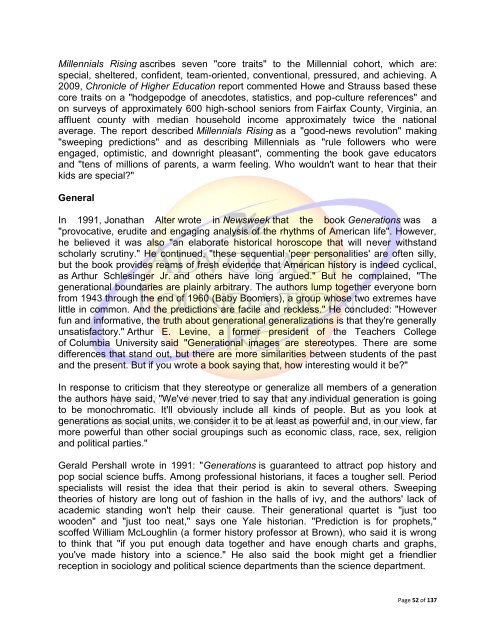Generational Progression
Generational Progression
Generational Progression
You also want an ePaper? Increase the reach of your titles
YUMPU automatically turns print PDFs into web optimized ePapers that Google loves.
Millennials Rising ascribes seven "core traits" to the Millennial cohort, which are:<br />
special, sheltered, confident, team-oriented, conventional, pressured, and achieving. A<br />
2009, Chronicle of Higher Education report commented Howe and Strauss based these<br />
core traits on a "hodgepodge of anecdotes, statistics, and pop-culture references" and<br />
on surveys of approximately 600 high-school seniors from Fairfax County, Virginia, an<br />
affluent county with median household income approximately twice the national<br />
average. The report described Millennials Rising as a "good-news revolution" making<br />
"sweeping predictions" and as describing Millennials as "rule followers who were<br />
engaged, optimistic, and downright pleasant", commenting the book gave educators<br />
and "tens of millions of parents, a warm feeling. Who wouldn't want to hear that their<br />
kids are special?"<br />
General<br />
In 1991, Jonathan Alter wrote in Newsweek that the book Generations was a<br />
"provocative, erudite and engaging analysis of the rhythms of American life". However,<br />
he believed it was also "an elaborate historical horoscope that will never withstand<br />
scholarly scrutiny." He continued, "these sequential 'peer personalities' are often silly,<br />
but the book provides reams of fresh evidence that American history is indeed cyclical,<br />
as Arthur Schlesinger Jr. and others have long argued." But he complained, "The<br />
generational boundaries are plainly arbitrary. The authors lump together everyone born<br />
from 1943 through the end of 1960 (Baby Boomers), a group whose two extremes have<br />
little in common. And the predictions are facile and reckless." He concluded: "However<br />
fun and informative, the truth about generational generalizations is that they're generally<br />
unsatisfactory." Arthur E. Levine, a former president of the Teachers College<br />
of Columbia University said "<strong>Generational</strong> images are stereotypes. There are some<br />
differences that stand out, but there are more similarities between students of the past<br />
and the present. But if you wrote a book saying that, how interesting would it be?"<br />
In response to criticism that they stereotype or generalize all members of a generation<br />
the authors have said, "We've never tried to say that any individual generation is going<br />
to be monochromatic. It'll obviously include all kinds of people. But as you look at<br />
generations as social units, we consider it to be at least as powerful and, in our view, far<br />
more powerful than other social groupings such as economic class, race, sex, religion<br />
and political parties."<br />
Gerald Pershall wrote in 1991: "Generations is guaranteed to attract pop history and<br />
pop social science buffs. Among professional historians, it faces a tougher sell. Period<br />
specialists will resist the idea that their period is akin to several others. Sweeping<br />
theories of history are long out of fashion in the halls of ivy, and the authors' lack of<br />
academic standing won't help their cause. Their generational quartet is "just too<br />
wooden" and "just too neat," says one Yale historian. "Prediction is for prophets,"<br />
scoffed William McLoughlin (a former history professor at Brown), who said it is wrong<br />
to think that "if you put enough data together and have enough charts and graphs,<br />
you've made history into a science." He also said the book might get a friendlier<br />
reception in sociology and political science departments than the science department.<br />
Page 52 of 137

















